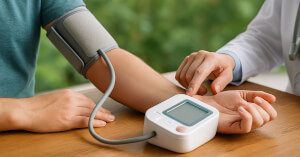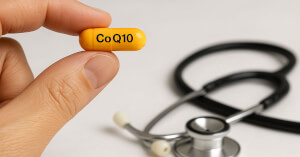
Ubiquinol (CoQ10)
Ubiquinol is the active form of CoQ10, an antioxidant that supports heart health and energy production at the cellular level.
Ubiquinol is the active, antioxidant form of Coenzyme Q10 (CoQ10), more readily absorbed and used by the body compared to ubiquinone.
It plays a crucial role in mitochondrial energy production and supports heart, brain, and cellular health, especially in older adults or those on statins.
Ubiquinol is taken for cardiovascular and energy support. It is well tolerated and preferred for individuals needing enhanced absorption.
Other names & forms of Ubiquinol (CoQ10) supplement : ubiquinol, reduced coq10, active coenzyme q10, qh-absorb
Possible Benefits
Ubiquinol (CoQ10) is the active, reduced form of Coenzyme Q10 that participates directly in mitochondrial electron transport to generate ATP, while also acting as a lipid-soluble antioxidant.
- Helps support Energy & Metabolism by boosting mitochondrial ATP production and reducing cellular fatigue.
- Supports Heart Health by protecting cardiomyocytes from oxidative damage and improving myocardial bioenergetics.
- Provides robust Anti-Aging effects by neutralizing lipid peroxyl radicals in cellular membranes.
- May contribute to Cognitive Health by safeguarding neuronal mitochondria and reducing neurodegenerative risk.
Side Effects
Ubiquinol, the active form of CoQ10, supports cellular energy and cardiovascular health, but some users may notice mild effects as their mitochondria adapt. Watch for:
- Possible mild gastrointestinal upset, nausea or diarrhea, especially if taken on an empty stomach
- Occasional headache or dizziness in sensitive individuals
- Temporary mild insomnia if taken late in the day
- Rare skin rash or itching, hypersensitivity reactions
- Very rare transient elevations in liver enzymes at high doses
Interactions
Possible interactions include:
- Statins and cardiac medications: Ubiquinol supports mitochondrial function and may improve tolerance to statins; discuss timing if using Red Yeast Rice.
- Anticoagulant and antiplatelet agents: Ubiquinol’s antioxidant action has minimal direct interactions but monitor clotting if on warfarin.
Precautions
Before supplementing with Ubiquinol, confirm none of the following apply to you. If they do, consult your healthcare provider:
- Individuals on anticoagulant medications (e.g., warfarin): CoQ10 forms may reduce efficacy; monitor INR closely
- People with low blood pressure: May cause further hypotension; monitor levels
- Those with liver disease: Use under supervision, possible enzyme alterations
- Pregnant or breastfeeding women: Limited safety data; use under medical guidance
- Patients scheduled for surgery: Discontinue at least two weeks prior, possible anesthesia interactions
Studies
These studies provide scientific insights into Ubiquinol (CoQ10) benefits:
A 2019 randomized, double-blind trial in 60 chronic heart failure patients found 200 mg/day ubiquinol for 12 weeks improved NYHA functional class by one level in 35% versus 10% with placebo and increased plasma CoQ₁₀ levels.
A 2018 meta-analysis of seven RCTs reported that ubiquinol reduces fatigue and improves exercise capacity in elderly and heart failure populations.
A 2017 crossover study in athletes showed 150 mg/day ubiquinol for 4 weeks attenuated exercise-induced oxidative stress markers versus placebo but did not affect performance metrics.
No RCTs have assessed ubiquinol for cognitive or metabolic endpoints in otherwise healthy adults, leaving its benefits beyond cardiovascular and fatigue support unproven.
Disclaimer: This page is for educational purposes and does not replace medical advice. If you're pregnant, have a condition, or take medication, speak with a qualified professional.








